AUSTIN, Texas — The Gulf Coast Power Association’s 37th annual fall conference, held in-person for the first time in three years, drew 685 registered attendees here last week. Strangely, that was the exact number of registrations the GCPA had for the same event in 2019.
When not renewing friendships and sharing handshakes and embraces with those they hadn’t seen in years, attendees were treated to panel discussions among lawmakers, market participants and industry experts on the ERCOT market, an oral history of the Texas grid operator, and a reenactment of the historical debates between Abraham Lincoln and Stephen Douglas.
Taking it all in was freshly minted ERCOT CEO Pablo Vegas, a surprise guest to the proceedings in just his second day on the job. He was shepherded during the conference’s first full day by Bill Flores, vice chair of the ISO’s Board of Directors. Vegas listened intently as the Joneses — Sam, ERCOT’s first CEO; Brad, its retiring interim CEO; Liz, Oncor’s regulatory affairs lead; and Dan, a respected energy consultant who helped create Texas’ competitive market — reminisced about their roles in ERCOT’s various market designs and how often their paths crossed at the ISO, Public Utility Commission and elsewhere in the industry.
Vegas seemed aware of the high expectations he faces and the responsibility he is undertaking.
“To think about the history of this institution that I’m now going to have the privilege to lead … each of the leaders up there have played a significant role in making and [preparing ERCOT for change],” he told RTO Insider. “It’s not so much a passing of the torch but just continuing to make sure that we all understand where it’s been, why it’s lit, and why that’s important.
“It’s just exciting to be a part of the next big change and big evolution that ERCOT has been going through, decade after decade over the years, and it’s great to be a part of this one. I can tell that there’s going to be a lot of help from the industry, a lot of suggestions, and I’m just looking forward to working through all of those together with such a great team.”
Introduced by Flores for a few opening comments to the audience, Vegas said he was “thrilled … honored and privileged” to be joining Team ERCOT and that he looked forward to working with the “incredible professionals” in the ballroom. Vegas invited those he did not know from an earlier stint in Texas to come meet him. (See Vegas Plans to ‘Engage Heavily’ in ERCOT Changes.)
“All I can say is, ‘Wow, what a time to be coming back into Texas,’ with what’s going on in the market and what’s going on in the economy,” he said. “I can’t remember a more exciting time to be in this industry.”
Flores Says Vegas ‘Checked All Boxes’
Flores, who led the ERCOT board’s search committee for Jones’ successor, told RTO Insider that Vegas checked all the boxes the group was looking for. He said Vegas stood out early after the committee initially identified 107 candidates to become the grid operator’s fifth full-time CEO.
“It quickly came down to a small handful of people. We were looking for somebody with an engineering technical background, somebody with good leadership attributes, including a selfless servant leadership style. We were looking for someone who had senior executive experience … and to a lesser extent, somebody who already had experience with the Texas market,” Flores said, nodding to Vegas’ two years as COO of American Electric Power’s AEP Texas subsidiary.
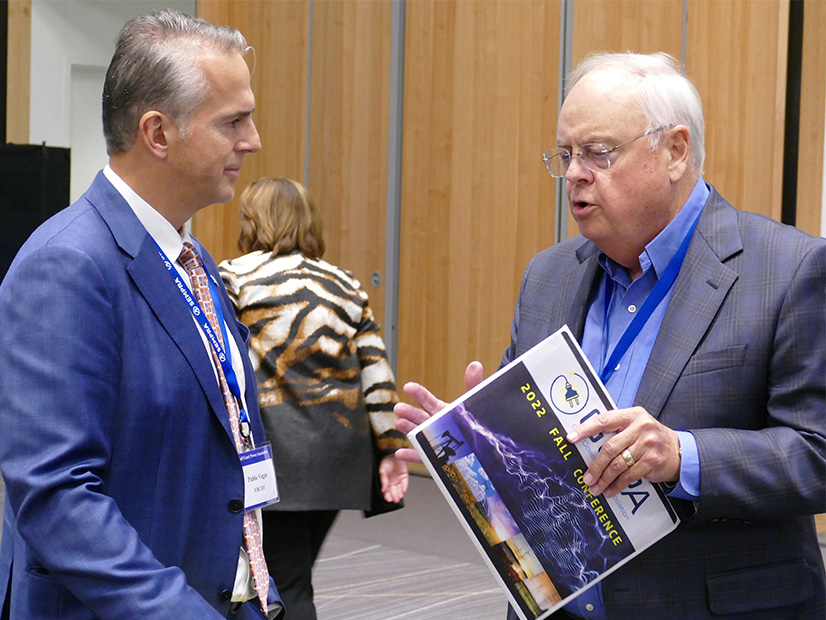 New ERCOT CEO Pablo Vegas chats with retired TXU, now Vistra, exec Mike Greene. | © RTO Insider LLC
New ERCOT CEO Pablo Vegas chats with retired TXU, now Vistra, exec Mike Greene. | © RTO Insider LLC
Told that it appears he has been a quick learner of ERCOT’s operations and functions, Flores said, “I’ve been a real nerd about this.
“I’ve read a lot of books; I have listened to tons of podcast. I spend a lot of time with Woody [Rickerson, ERCOT’s vice president of system planning and weatherization] and the gang, and I’m still not done yet.”
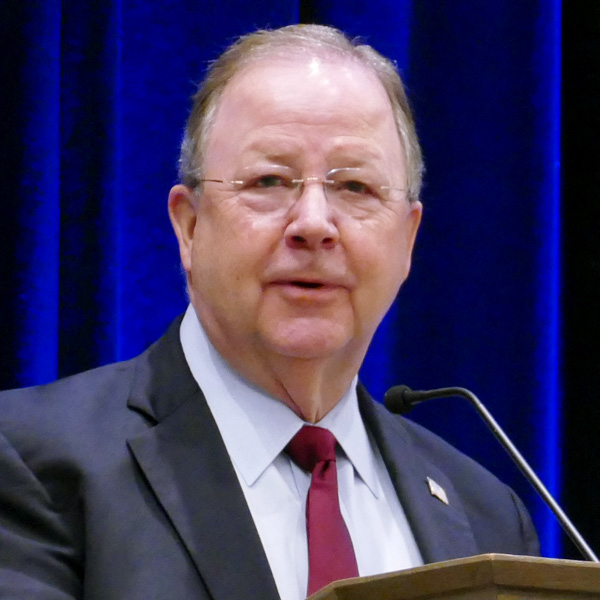 Bill Flores, ERCOT | © RTO Insider LLC
Bill Flores, ERCOT | © RTO Insider LLCA five-term Republican member of the U.S. House of Representatives, Flores was appointed to the ERCOT board last year and serves as its vice chair. A certified public accountant, he has a background in the oil and gas industry. During his keynote address, Flores warned of the danger of relying on a single fuel, as Europe has discovered with Russian natural gas after its invasion of Ukraine. However, he also noted he is the largest residential solar user in his home county, and he extolled an “all-of-the-above” approach to ERCOT’s fuel mix.
“One of the things I’ve noticed in environmental analysis today is that when you look at fossil generation, it’s looked at from end to end,” Flores said. “When you’re looking at other forms of generation, it’s just from when you turn it on to when you turn it off. Every source of generation needs to be looked at end-to-end on the environmental and emission scale.
“The bottom line from a policymaking perspective is that we need all-of-the-above solutions that have balance, that follow the laws of nature with respect to electricity, that follow the laws of economics,” he said. “We’ll have better policy outcomes when we follow those laws, versus what we as humans think we can do.”
GCPA Members Honor Jones
GCPA members and conference attendees honored Brad Jones with an extended standing ovation after his panel discussion with three other Joneses ended.
GCPA President Mark Dreyfus, who represents commercial consumers on ERCOT’s Technical Advisory Committee, recalled his more-than-25-year association with Jones. It began when Dreyfus was a PUC staff member and Jones was the “lowest guy on the totem pole” for TXU, Vistra’s predecessor.
“His job, as far as I could tell, was to chase after us following a PUC open meeting to find out exactly what the commissioners had decided so he could report back,” Dreyfus said. “I really liked that Brad Jones back then.”
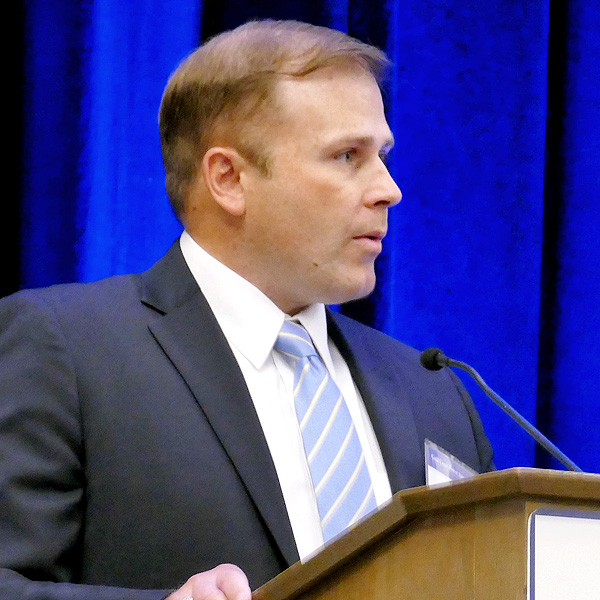 Brad Jones (second from right), flanked by Oncor’s Liz Jones and former ERCOT CEO Sam Jones, listens as GCPA President Mark Dreyfus recounts a 25-year association between the two. | © RTO Insider LLC
Brad Jones (second from right), flanked by Oncor’s Liz Jones and former ERCOT CEO Sam Jones, listens as GCPA President Mark Dreyfus recounts a 25-year association between the two. | © RTO Insider LLC
Jones rose through the ranks at TXU and played an integral role in designing ERCOT’s competitive market. Like Dreyfus, Jones presided over GCPA. He joined ERCOT as COO and then “packed up his cowboy boots,” as Dreyfus said, and left Texas for a short stint as NYISO’s CEO.
“But I know he was lonely for home and family,” said Dreyfus, who visited Jones in Albany, N.Y. “He treated me like family and treated me to an insider’s tour of the city: well-cooked sirloin, beer pong and a reggae show.”
Jones left NYISO in 2018 and retired to his home in Austin. That is, until the February 2021 winter storm came within minutes of collapsing the Texas grid, leaving ERCOT and the industry in “disarray,” as Dreyfus put it.
“Who would step up and take on the responsibility of leadership? I can’t think of anyone other than Brad, who brought his experience in the industry, experience in the New York ISO, and that demeanor he has which is so successful with our industry members at the legislature and with the membership of GCPA,” Dreyfus said. “We don’t have a gift card or flowers or custom GCPA cowboy boots, but we do have a reception immediately following where I hope you will take a minute to thank Brad.”
Jones could do little more than laugh and nod his head in appreciation.
“Brad has done a great job of readying ERCOT for this next level of change,” Vegas said after the applause settled.
“[Jones] stepped up at a really critical time for the 26 million Texans that are served by the ERCOT part of the Texas grid and to help keep the team together,” Flores said. “He worked with policymakers and regulators to keep the lights on, so we owe him.
McAdams: Give Market-based Solutions a Chance
PUC Commissioner Will McAdams gave the conference attendees a sneak preview of the commission’s proposed Phase II market design, which the commission continues to plan for a mid-November release. He said the commissioners recognize that the grid of the “very near future” will consist of more renewable and intermittent resources than dispatchable capabilities.
“And that’s fine. We believe, I believe, to cover the variability of intermittent output, we must ensure that sufficient quantities of dispatchable power cover system needs during forecasted high risk periods,” he said in a keynote address. “This serves as the basis of what we’re discussing now. This will allow us to reduce our out-of-market actions like [reliability unit commitments] and replace them with market-based solutions. [As other speakers suggested], this framework will be based on market principles, which I hope will represent the consensus of the commission.”
 Will McAdams, Texas PUC | © RTO Insider LLC
Will McAdams, Texas PUC | © RTO Insider LLCMcAdams said the Phase II market adjustments will encourage dispatchable generators to maintain their facilities, and, if necessary, to replace retiring units with new generation. But, he reminded his audience, the PUC can’t guarantee that new generation will be built.
“We can influence markets, but we cannot command them to deploy capital,” McAdams said. “If policymakers believe that they require a guarantee that new generation be built in order to meet growing system demands, then a policy must be taken up and considered by the state legislature. It is a crossroads … one route stays the course with markets and market-based solutions. The other would instruct the PUC to assume a more command-and-control posture in how electricity is generated and delivered within ERCOT.”
Historically, markets, collective viewpoints and their stakeholders are best suited to adapting to changes, he said.
“As such, I believe that the best way to restore the public’s trust and confidence in our grid is for the public utility commission, ERCOT and our market participants to work together to demonstrate that we can build a policy to achieve maximum grid reliability,” he said, “and at a sustainable cost level to Texas consumers that may endure challenges by the naysayers and detractors and demonstrate to the legislature that this is a market worth saving.”
Texas Politicos Wait on ERCOT Redesign
Count Texas lawmakers among ERCOT stakeholders who are looking forward to the PUC’s release of its Phase II market design, expected in mid-November. The Texas legislature opens its five-month biennial session Jan. 10, and legislators have asked to vet the PUC’s market design before the ISO’s staff begins to implement it. (See Texas Lawmakers to Vet ERCOT Market Redesign.)
“For the most part, we’re all waiting for the next big change,” State Sen. Nathan Johnson (D) said, noting discussions taking place within several Texas energy advisory and reliability committees. “I don’t mean to be dismissive of it being a lot of talk, but because it’s a very important conversation, but we have yet to see the results from it. We have a variety of perspectives. We have competing viewpoints … but as we move into the legislative session, and as we come out of the legislative session, we’re going to have to have some clarity.”
Johnson said legislators, who passed several laws related to the grid’s near-collapse during last year’s winter storm, expected the market design to have been further along that it is now. (See Abbott Signs Texas Grid Legislation into Law.)
“As much fun as it is, this is hard. We don’t have the answer yet,” he said. “We need the confidence of the investors. We’re not going to get there with a bunch of day-ahead ancillary services. We’re going to see some form of a capacity market in our energy-only market. There’s going to be an element of predictability and an agreed-upon predictability standard.”
State Rep. Phil King (R), who represents a gas-rich district, said electric power has been the most complex, competitive and diverse issue he has dealt with in his 24 years at the Capitol.
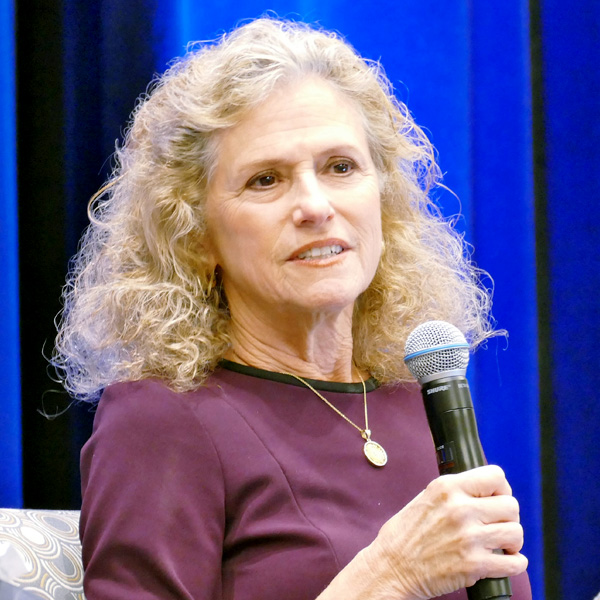 State Rep. Phil King shares his thoughts on ERCOT’s market redesign as State Sen. Nathan Johnson listens. | © RTO Insider LLC
State Rep. Phil King shares his thoughts on ERCOT’s market redesign as State Sen. Nathan Johnson listens. | © RTO Insider LLC
“I think this is going to be the second most substantive change we’ve made in how we do all this since 1999 … we created a competitive market that was the envy of the world,” King said, referring to Senate Bill 7 that deregulated ERCOT’s wholesale and retail markets.
 Rep.Donna Howard | © RTO Insider LLC
Rep.Donna Howard | © RTO Insider LLC“From my perspective, it’s how do we make sure that we have enough gas-fired generation that can be built in a way that companies can make a reasonable profit? But how do we incentivize building enough gas-fired power without stepping over that line and entering back into a regulatory market?” King asked. “Renewables have a big place in Texas. I think we can have a really hard discussion about how much that is. Relative to the amount of dispatchable electricity, I think there’s too much. And so how do we incentivize from a financial perspective and a regulatory perspective for gas-fired plants to be built without stepping off that cliff and losing the competitive market?”
“We have to be agnostic about the future,” countered State Rep. Donna Howard (D). “Obviously, we need to have resiliency, and we need to have reliability. It needs to be affordable. We need to have dispatchable [generation] and we need to have predictability. We know that renewables, of course, are predictable [to forecast]. Gas is volatile. We are so fortunate to have the thermal resources that we have … We want to make sure that whatever the market redesign ends up being, that it is going to incentivize whatever it is that will give us the power we need when we need it.”
Lincoln-Douglas? Try Barnes-Stover
Apex Clean Energy’s Mark Stover and NRG Energy’s Bill Barnes did their best to recreate the famed 1858 senatorial debates between Abraham Lincoln and Stephen Douglas, albeit in condensed form. Rather than conduct seven three-hour debates, the two settled for a 30-minute discussion over whether transmission planning and regulatory reforms to relieve congestion are compatible with regulatory design changes to retain and incentivize dispatchable generation in ERCOT’s energy-only market.
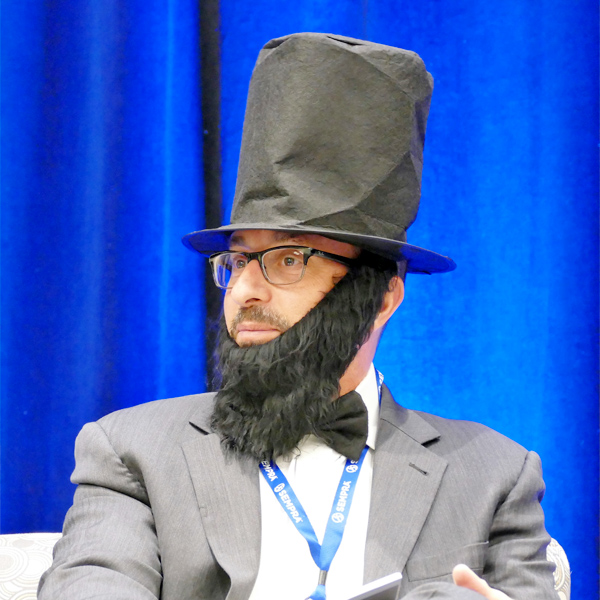 Bill “Honest Abe” Barnes, NRG | © RTO Insider LLC
Bill “Honest Abe” Barnes, NRG | © RTO Insider LLC“I have made many sacrifices throughout my career for the entertainment of the GCPA audience. This might be a new low or new high, so I hope you guys appreciate this,” Barnes said, donning a fake beard and what passed for a stovepipe hat in his role as Honest Abe. “Abraham Lincoln was like nine feet tall, so you’re going to have to use your imagination.”
“Bill definitely wins the costume category,” admitted Stover, who wore a vest and a long coat. “But at the very least, Bill and I got a jump on our Halloween shopping this year.”
Stover, Apex’s director of state affairs, said in his address that market design and transmission reforms are compatible. If done right, he said, ERCOT’s transmission planning process “can actually bolster our efforts to increase reliability on the ERCOT system, something every stakeholder wants, including the renewable energy sector.”
“If the transmission projects can deliver new wind, solar, storage and, yes, natural gas paired with something that we don’t talk a lot about, increased efficiency and demand response, we can deliver the same amount of power or more at a lower cost than existing fossil assets or new planned large thermal assets,” Stover said. “We need to move away from our just-in-time regime, which is increasing costs on consumers and unnecessarily straining our power grid and keeps a range of benefits from flowing to consumers.”
“Hogwash!” Barnes, NRG Energy’s senior director of regulatory affairs, bellowed after Stover’s close.
“Transmission planning processes and regulatory reforms that create preference for transmission development fundamentally conflict with the foundational principles of an energy-only market and work to defeat the incentives to retain and attractive dispatchable resources,” Barnes said. “Transmission congestion is a design feature of LMP-based markets, not an excuse to endlessly build more transmission lines. These deliberate pricing differences allow for the competitive market to address transmission bottlenecks through redispatch of generation and, if allowed to persist, through private investment, rather than regulated costs to captive ratepayers.”
The audience judged the debate a draw. Douglas narrowly won election to the Illinois U.S. Senate seat up for grabs after the debates. Two years later, though, Lincoln won the big prize when he defeated Douglas in the 1860 presidential election.
Vistra’s Haley Receives GCPA Award
GCPA presented Vistra’s Ian Haley with its emPOWERing Young Professionals Award, as selected by the organization’s board. The award is presented annually to an individual under the age of 40 who has achieved excellence in the power industry, making unique contributions to the success of the electric power market and serving as a role model and leader for others.
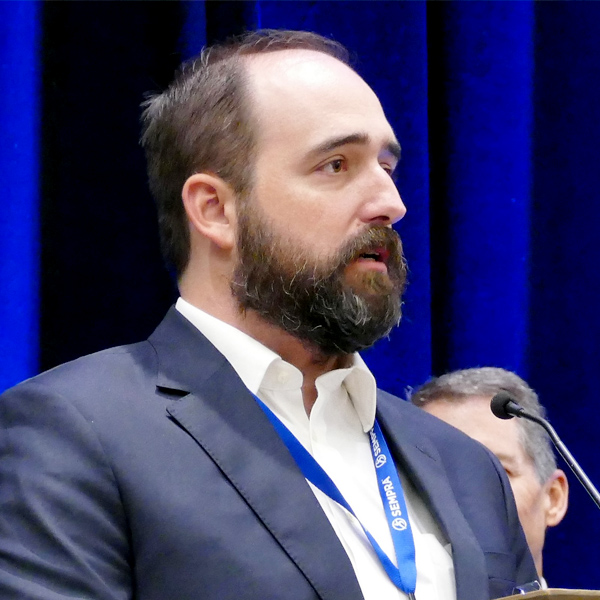 Ian Haley, Vistra | © RTO Insider LLC
Ian Haley, Vistra | © RTO Insider LLCVistra’s senior director of regulatory policy, Haley was described as “an ardent participant in the stakeholder process.” He represents Vistra subsidiary Luminant on TAC and works on several other ERCOT committees, vice chairing the Supply Analysis Working Group.
“I cannot tell you how much I appreciate this,” Haley told the audience. “I’m deeply honored, even though quite a few of you have told me there’s no way I’m under 40. I feel extremely fortunate to work in an industry that I find so interesting and have the opportunity to work with so many people I consider friends.”
“He’s a fellow Tulane graduate,” Vistra CEO Jim Burke said in introducing Haley. “You probably didn’t read that in the bio, but good people come out into Tulane University.”
“Ian has a knack for reaching out across the aisle in the ERCOT stakeholder process and is an adept negotiator,” Ned Bonskowski, Vistra’s vice president of Texas regulatory policy, said in a statement. “Some of his strongest work is when he is forging consensus across disparate stakeholders on contentious issues.”
The award’s nomination criteria includes career progress, industry involvement, leadership development, role model for other young professionals, and expertise, passion and the ability to inspire others.




